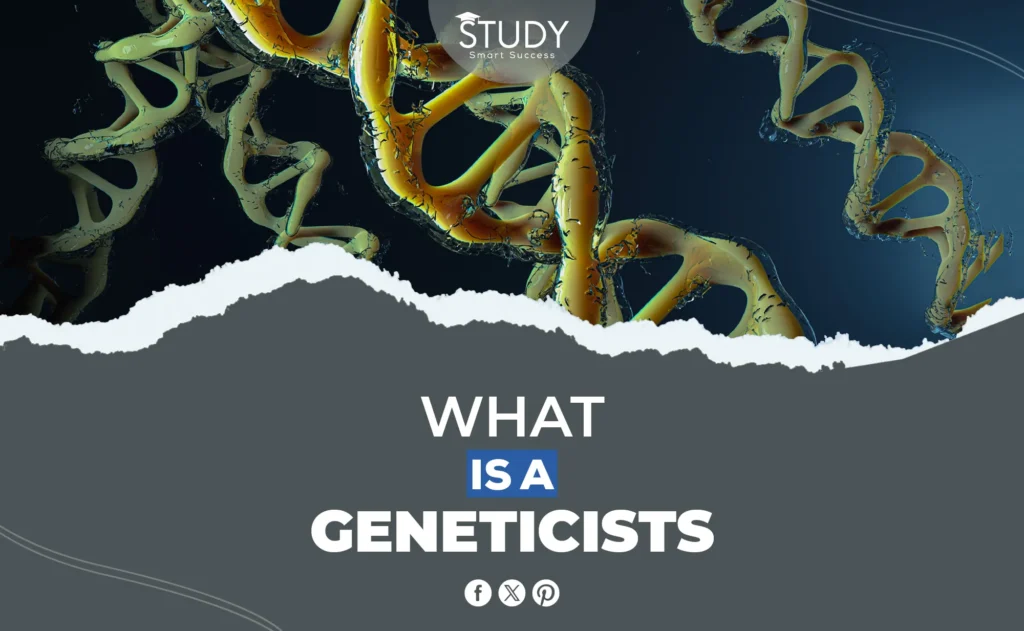Introduction
Genetics, a cornerstone of modern science, reveals life’s blueprint. It is about genes, heredity, and variety in living things. This field studies how features, including eye color, hair texture, and illness predispositions, are passed on. Genetics extends beyond physical traits to the molecular instructions that control cell function, organism growth, and disease progression.
DNA, gene, and chromosomal geneticists lead this discipline. They employ genetic material to study living things and develop medical and agricultural technologies. By studying heredity and genetics, geneticists help society understand diseases and find new treatments. Geneticists’ educational path, talents, and job prospects in this ever-changing field will be covered in this blog.
Educational Background and Skills Required
Being a geneticist takes dedication to study and science. Most geneticists start with a Bachelor of Science in Genetics, Biology, Biochemistry, or a related field. Undergraduates study molecular biology, biochemistry, chemistry, and genetics. This primary education prepares students for genetics studies by explaining how living things work at the molecular level.
A college degree is usually just the start for geneticists. Many geneticists earn a Master’s or Ph.D. in genetics or a related discipline like clinical or molecular genetics to thrive in the field. Students spend years doing experiments, analyzing data, and contributing to scientific knowledge in graduate school. Genetics enthusiasts find it challenging but rewarding.
To succeed in their jobs, geneticists must learn many skills besides formal schooling. These are some of the most important:
- Research and Analytical Skills: A geneticist plans experiments, conducts in-depth studies, and interprets complicated data. A good understanding of research methods is essential, whether studying the genetics of plants or finding genetic mutations in people.
- Attention to Detail: Even the most minor mistakes can significantly affect genetics. Geneticists must be very careful to ensure that their data is correct and that their studies cover all the bases.
- Problem-Solving Abilities: We often deal with problems we didn’t expect in genetics studies. Geneticists must be able to think critically and artistically to solve problems, whether trying to figure out genetic diseases or make new crops with better traits.
- Communication Skills: Geneticists often work in groups and have to explain complicated science ideas to their coworkers, patients, or people who make policy. It is essential to communicate clearly so the genetic study is understood and used correctly.
Types of Geneticists
Not all geneticists study the same things because genetics is a vast field. Geneticists can work in many fields, from medicine to farming to study, because they can specialize in different areas. Most geneticists are one of the following types:
- Clinical Geneticist: Clinical geneticists treat genetic disorders. These experts can identify genetic diseases and recommend treatments. Patients with cystic fibrosis, Down syndrome, and rare hereditary malignancies may see clinical geneticists. They frequently collaborate with other clinicians to develop genetically customized treatments.
- Research Geneticist: Research geneticists study fundamental genetic pathways. They undertake lab experiments to study gene function, inheritance, and evolution. They also investigate microbes and the human genome to further science. Their research may advance medicine, agriculture, and conservation.
- Genetic Counselor: Hereditary counselors inform patients and families about hereditary concerns using research. Genetic test results and their consequences on health, reproduction, and family planning are advised. Genetic counselors help patients make difficult health decisions, so they must understand genetics and communicate well.
Responsibilities
It depends on what kind of genetics they study; their responsibilities can differ. But most geneticists do the same: research and analyze genetic information.
Geneticists study DNA, genes, and chromosomes. They use high-tech techniques and equipment to examine genetic material in labs and clinics. They map chromosomes to detect genetic illnesses, sequence DNA to find mutations or investigate gene expression to establish how traits are passed down.
Often, medical geneticists must uncover genetic disorders and flaws. Clinical geneticists work with patients with genetic disorders. Genetic tests can detect Huntington’s, sickle cell anemia, and various cancers. Finding these issues early enables prompt action, which is often needed for therapy.
Investigative geneticists also investigate gene patterns, examine how qualities are passed along through genes. They study how animals evolve, how diseases spread, and how genes affect behavior. They may test plants, animals, or people to understand how genes affect traits.
Geneticists are crucial to healthcare because they recommend treatments based on genetics. DNA is one of the most promising topics for personalized medicine, where therapies are tailored to each patient’s DNA. Knowing each patient’s genetic profile helps geneticists plan better treatments.
Applications of Genetics in Modern Science
Genetics has effects that go far beyond what happens in the lab. Its uses are widespread and will affect the future of health, farming, forensics, and even protecting the environment.
Personalized Medicine
Genetics’ medical uses are fascinating. Individualized medicine tailors treatments to genetics. Genetic changes, which only work for some patients, affect cancer treatment. Evaluate a patient’s genetic profile to target cancer cells while conserving healthy tissue.
Gene Therapy
Gene therapy is another innovative genetics use. This innovative approach fixes hereditary illnesses by replacing faulty genes with good ones. Gene therapy may treat or cure muscular dystrophy, cystic fibrosis, and hemophilia, albeit it is still developing. Scientists are making improvements, giving those with life-changing diseases hope.
Agriculture
Geneticists are transforming farm food production. GMOs have helped them build pest-resistant, water-efficient, and high-yield foods. These innovations are helping to alleviate global food shortages, extend crop life, and reduce environmental impact.
Forensic Science
Genetics has also changed the field of forensic science. DNA testing is now essential to solving crimes, finding victims, and even freeing wrongly convicted people. Geneticists in forensic labs use DNA analysis to connect crime scene samples with possible suspects. This is beneficial evidence for criminal investigations.
Anthropology
Genetics is an essential part of both evolutionary biology and culture. Geneticists can track changes in evolution and learn about the roots of species, including humans, by looking at the genes of extinct creatures. This study helps us determine how living things have changed with their surroundings over millions of years.
Work Environment and Career Opportunities
Clinical Geneticists
There are a lot of different places where geneticists work, and it depends a lot on what they specialize in. There are a lot of hospitals, medical centers, and private offices where clinical geneticists and genetic counselors work and see patients. They usually take care of patients, do genetic tests, and work with other healthcare workers as part of their job.
Research Geneticists
Geneticists, on the other hand, tend to work in labs at a university, a research center, or a private biotechnology company. They run experiments, examine genetic data, and write scientific papers. Geneticists who do research often work on government, private businesses, or non-profits-funded projects.
Pharmaceutical Industry
Geneticists also have many job opportunities in the pharmaceutical business. Based on genetic information, they help make new drugs and treatments. Science and genetic testing companies also hire geneticists. This is especially true as the need for genetic testing and personalized medicine grows.
Many people want to be geneticists, and that number is likely to grow as technology and medicine improve, and more people need genetic knowledge. Geneticists can work in various fields, from healthcare to study and academia.
Challenges Faced by Geneticists
Even though genetics has many benefits, it also has some problems. One of the most critical issues is the morality of some genetic studies, like editing genes, changing genes, and testing pregnant women for genetic diseases. Geneticists must deal with these challenging moral problems while ensuring their work follows strict rules and guidelines.
Another problem is that genetics studies are technically challenging. Working with genetic material is a very specialized and delicate task that requires great care and accuracy. Experiments often fail and can take a lot of time and money. Geneticists need to be strong and patient because many things they find may not be helpful for years.
Conclusion
Geneticists are at the cutting edge of some of modern science’s most exciting and critical areas. Their work could change health, farming, and even how people are punished for crimes. There are many ways to add to scientific progress and have a lasting effect on society if you are interested in a career in genetics. As our knowledge of genetics grows, geneticists will become more and more critical in shaping the future of health and science.


